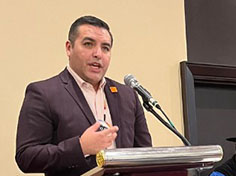Bill 23 negatively impacts Aboriginal and inherent rights

By Rick Garrick
OTTAWA — The provincial government’s lack of consultation with First Nations over Bill 23, More Homes Built Faster Act, 2022, was raised by Anishinabek Nation Grand Council Chief Reg Niganobe and other leaders during a Dec. 7 press conference in Ottawa. Bill 23 passed Third Reading and received Royal Assent on Nov. 28.
“The purpose of today’s gathering is to bring awareness to the provincial government’s failure to engage with First Nations prior to the passing of Bill 23, which is another missed opportunity to engage in meaningful dialogue and avoid challenges of conflict like we are possibly having now,” Grand Council Chief Niganobe says. “Bill 23 is an omnibus bill that proposed sweeping changes to the province’s natural heritage and land-use planning, and this is all under the guise of being a solution to the housing crisis in Ontario. This bill is an enormous threat to First Nation jurisdiction as well as inherent and treaty rights.”
Niganobe says Ontario Regional Chief Glen Hare received letters from Steve Clark, minister of Municipal Affairs and Housing, and the Ministry of Natural Resources and Forestry on Oct. 25 about the launch of Bill 23, which was carried during the First Reading on that same day.
“Minister Clark’s letter included a request for feedback on the proposed legislative, regulatory and policy changes contained within the bill,” Niganobe says. “The letter also stated they would be happy to work with us, happy to meet with us, meet our engagement needs on all these issues or whatever issues we were going to bring up.”
Niganobe says Hare responded to Clark’s letter by outlining how Bill 23 would have negative impacts on First Nations inherent Aboriginal and treaty rights and a request for a meeting to discuss these concerns sent to Premier Doug Ford, Clark and ministers Greg Rickford and David Piccini.
“Unfortunately, every single one of the letters that were sent and attempts at correspondence with the government of Ontario have gone unanswered,” Niganobe says.
Wiikwemkoong Unceded Territory Ogimaa Kwe Rachel Manitowabi says she is very concerned about the lack of clear engagement with First Nations by the provincial government.
“I am extremely concerned about the impacts Bill 23 will have on our people, our lands, our waters and our communities,” Manitowabi says. “The concern I have about Bill 23 is this, the passage of it does not provide for any consultation, duty to consult or any permission to create any disturbance to the land for any reason including housing. If there is an issue with housing, it’s within Anishinaabe territories and I would invite Premier Ford and his government to spend some time in my territory to look at the housing needs in my community — 75 per cent of my calls deal with housing.”
Manitowabi adds that she calls on Ford and the provincial government to repeal Bill 23.
“Bill 23 must be repealed and we must work together to find a solution to the housing crisis that does not involve overriding First Nations engagement and consultation protocols,” Manitowabi says. “When you look at the Greenbelt, the people of my territory went to Niagara in 1764 to establish a Covenant Chain and within that understanding there is a relationship between Indigenous people and the Crown that when something is required, something is needed that Covenant Chain would be tugged upon to say this is what we need in terms of the sharing of this land, the sharing of these resources. That Covenant Chain needs to be tugged at this time, Premier Ford has a responsibility as provincial Crown to respond to that tugging of the Covenant Chain.”
Mississaugas of Scugog Island Chief Kelly LaRocca says First Nations were not consulted by the provincial government in advance of its decision to pass Bill 23 or to amend Greenbelt-related legislation.
“These legislative and regulatory changes are therefore unconstitutional,” LaRocca says. “It is deeply disappointing that in this time where reconciliation is discussed by governments of all levels, they pursue merely symbolic gestures instead of meaningful action and respectful engagement. We would strongly urge all levels of government to engage in meaningful partnership with First Nations prior to pursuing any significant activity, environmental or otherwise. In this case, we are deeply concerned about the lack of consultation regarding planning amendments which would lead to the permanent development of our region’s very few remaining natural areas. As such, we would ask that the province repeal Bill 23 and not pursue any significant planning reforms until such time it addresses its legal and democratic failures.”
LaRocca says her community is deeply concerned by the rapid development taking place across its treaty lands, which continues to threaten watersheds as well as natural features such as the Oak Ridges Moraine.
“The Greenbelt provides us with air and water filtration, offers flood protection, is home to protected species and is a carbon sink,” LaRocca says. “This is why it was sought to be protected in the first place.”
Other leaders who expressed concerns about Bill 23 were Hiawatha Chief Laurie Carr, Caldwell Chief Mary Duckworth and Kiiwetinoong MPP Sol Mamakwa.


